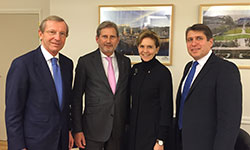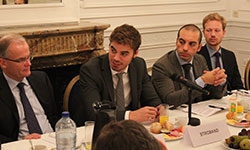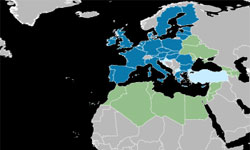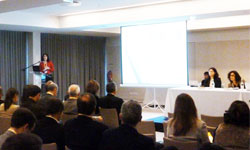BusinessEurope Headlines No. 2015-39
European business expectations from COP21

Together with its 40 national employer and industry federations in Europe, BusinessEurope strongly supports all efforts to reach an ambitious and legally binding agreement in Paris, as outlined in a video message circulated just ahead of the summit. BusinessEurope is present in Paris during the COP21 negotiations. Director for Industrial Affairs Alexandre Affre underlined business expectations from the Paris deal at a first event co-hosted by MEDEF, AFEP and the Cercle de l’Industrie on 2 December. A press conference “Progress or not? BusinessEurope's take on the negotiations so far” will be held on 8 December 2015 at 2pm in Paris Le Bourget (Press Conference Room 3).
Play video, read more or contact: Alexandre Affre
European policy challenges for the Alpine regions
 “The Alpine area is one of Europe’s most industrialised regions. It plays an important role in supporting job creation, competitiveness and economic growth”, BusinessEurope Director General Markus J. Beyrer said at a high-level discussion on 1 December in Brussels. Innovative regions in the EU, he added, are crucial to bring growth back to Europe and improve citizens’ quality of life. The event was hosted by the governor of Salzburg Wilfried Haslauer and also welcomed European Commissioner Johannes Hahn, Austrian Ambassador to the EU, Walter Grahammer and representatives from doplomacy, industry, politics and the civil society.
“The Alpine area is one of Europe’s most industrialised regions. It plays an important role in supporting job creation, competitiveness and economic growth”, BusinessEurope Director General Markus J. Beyrer said at a high-level discussion on 1 December in Brussels. Innovative regions in the EU, he added, are crucial to bring growth back to Europe and improve citizens’ quality of life. The event was hosted by the governor of Salzburg Wilfried Haslauer and also welcomed European Commissioner Johannes Hahn, Austrian Ambassador to the EU, Walter Grahammer and representatives from doplomacy, industry, politics and the civil society.
Contact: Dominik Futschik
Single market strategy: call on member states to apply the rules consistently
 One of the keys for a well-functioning single market is ensuring that existing rules are applied correctly and consistently by national administrations, BusinessEurope Internal Market Deputy Director Guido Lobrano stressed at a BDI/Konrad Adenauer Stiftung event organised on 1 December in Brussels with representatives from the European Commission and the upcoming Dutch Presidency. Implementation of last October’s single market strategy by the Commission needs to focus on reducing remaining requirements and bureaucracy to trade in different member states. Looking forward, Europe will also need to swiftly take a clear stance on how to deal with innovative models like the sharing economy to avoid a fragmented approach at national level.
One of the keys for a well-functioning single market is ensuring that existing rules are applied correctly and consistently by national administrations, BusinessEurope Internal Market Deputy Director Guido Lobrano stressed at a BDI/Konrad Adenauer Stiftung event organised on 1 December in Brussels with representatives from the European Commission and the upcoming Dutch Presidency. Implementation of last October’s single market strategy by the Commission needs to focus on reducing remaining requirements and bureaucracy to trade in different member states. Looking forward, Europe will also need to swiftly take a clear stance on how to deal with innovative models like the sharing economy to avoid a fragmented approach at national level.
Contact: Guido Lobrano
Mind the impact of capital requirements on economic growth
 Future work on the capital requirement rules (CRR and CRD IV) should ensure that the legislation will function effectively, encouraging growth and preventing damage to businesses in the wider economy, BusinessEurope Director General Markus J. Beyrer wrote to Financial Stability, Financial Services and Capital Markets Union Commissioner Lord Hill. The rules have restored confidence in financial institutions and made them more resilient but, at the same time, bank lending came under pressure. There is a significant risk that as economic growth picks-up, banks will be unable to meet companies’ funding requirements on the desired scale. Considering that financing options which entail recourse to the capital market are not always an alternative for smaller and medium-sized companies, these companies will continue to need reliable access to bank loans.
Future work on the capital requirement rules (CRR and CRD IV) should ensure that the legislation will function effectively, encouraging growth and preventing damage to businesses in the wider economy, BusinessEurope Director General Markus J. Beyrer wrote to Financial Stability, Financial Services and Capital Markets Union Commissioner Lord Hill. The rules have restored confidence in financial institutions and made them more resilient but, at the same time, bank lending came under pressure. There is a significant risk that as economic growth picks-up, banks will be unable to meet companies’ funding requirements on the desired scale. Considering that financing options which entail recourse to the capital market are not always an alternative for smaller and medium-sized companies, these companies will continue to need reliable access to bank loans.
Read more or contact: Erik Berggren
'No' to the principle of “the same pay for the same job in the same place” in the posting of workers directive
 Introducing a principle of “the same pay for the same job in the same place” in the posting of workers directive would be a harmful EU interference in national wage-setting mechanisms and in the role of the social partners in many member states. The EU must not jeopardize the foundation of national wage-setting systems. Asking companies to compare the conditions offered to posted workers with the conditions offered to workers employed by other companies would be radically different from the situations targeted by the existing principles of equal pay for equal work for men and women and the ban on discrimination because of nationality. Moreover, requiring foreign companies to offer wages above minimum wages applicable to national companies would create a discriminatory situation against foreign service providers, thereby hampering the freedom to provide services in the EU single market. These were the main messages sent by BusinessEurope President Emma Marcegaglia in a letter to the President of the European Commission Jean-Claude Juncker on 26 November 2015.
Introducing a principle of “the same pay for the same job in the same place” in the posting of workers directive would be a harmful EU interference in national wage-setting mechanisms and in the role of the social partners in many member states. The EU must not jeopardize the foundation of national wage-setting systems. Asking companies to compare the conditions offered to posted workers with the conditions offered to workers employed by other companies would be radically different from the situations targeted by the existing principles of equal pay for equal work for men and women and the ban on discrimination because of nationality. Moreover, requiring foreign companies to offer wages above minimum wages applicable to national companies would create a discriminatory situation against foreign service providers, thereby hampering the freedom to provide services in the EU single market. These were the main messages sent by BusinessEurope President Emma Marcegaglia in a letter to the President of the European Commission Jean-Claude Juncker on 26 November 2015.
Read more or contact: Maxime Cerutti
What is in the new European neighbourhood policy?
 The communication on an updated European neighbourhood policy, jointly published by the European Commission and the EEAS on 18 November 2015, presents ambitious proposals that go into the right direction. Considering the radical political, social and economic changes that took place in the EU and the broader neighbourhood in the past years, the communication makes a number of recommendations for a more comprehensive and effective policy. Through the new policy, the EU will continue to promote universal rights, such as democracy and the rule of law, while stabilisation becomes the main priority of the policy. Differentiated approaches will apply, in an effort to reflect the needs and interests of both the EU and its neighbours better. The new policy recognises the role of the ‘neighbours of neighbours’ and will involve them as appropriate, especially in addressing common challenges such as migration or energy. Participation of the private sector in different projects under the new policy is also underlined. Finally, involvement of EU member states in the policy-making process is expected to increase. The EU will now consult its neighbours on the new policy, which should start being implemented as soon as possible.
The communication on an updated European neighbourhood policy, jointly published by the European Commission and the EEAS on 18 November 2015, presents ambitious proposals that go into the right direction. Considering the radical political, social and economic changes that took place in the EU and the broader neighbourhood in the past years, the communication makes a number of recommendations for a more comprehensive and effective policy. Through the new policy, the EU will continue to promote universal rights, such as democracy and the rule of law, while stabilisation becomes the main priority of the policy. Differentiated approaches will apply, in an effort to reflect the needs and interests of both the EU and its neighbours better. The new policy recognises the role of the ‘neighbours of neighbours’ and will involve them as appropriate, especially in addressing common challenges such as migration or energy. Participation of the private sector in different projects under the new policy is also underlined. Finally, involvement of EU member states in the policy-making process is expected to increase. The EU will now consult its neighbours on the new policy, which should start being implemented as soon as possible.
Contact: Sofia Bournou
Revived optimism for an EU-Mercosur agreement?
 BusinessEurope is convinced that an EU-Mercosur free-trade agreement is the best tool to achieve meaningful market openings and improve the overall trade and investment conditions for companies in both regions, Director General Markus J. Beyrer wrote in a letter to Trade Commissioner Cecilia Malmström on 25 November. European companies appreciate the effort from the Mercosur side to revive the discussions over a trade deal. However, more clarity on the scope of the Mercosur proposal covering 87% of tariff lines and effective support from all Mercosur partners to a meaningful and ambitious agreement with the EU is necessary.
BusinessEurope is convinced that an EU-Mercosur free-trade agreement is the best tool to achieve meaningful market openings and improve the overall trade and investment conditions for companies in both regions, Director General Markus J. Beyrer wrote in a letter to Trade Commissioner Cecilia Malmström on 25 November. European companies appreciate the effort from the Mercosur side to revive the discussions over a trade deal. However, more clarity on the scope of the Mercosur proposal covering 87% of tariff lines and effective support from all Mercosur partners to a meaningful and ambitious agreement with the EU is necessary.
Read more or contact: Eleonora Catella
Highlights of Ceramic Days
 Speaking at the Ceramic Days in Portugal on 26-27 November, BusinessEurope Adviser Margarida Bolzer gave an overview of the European climate and energy policies with an impact in the ceramics sector. National businessmen and experts in the ceramic business were able to exchange views and offer their national perspectives for improving European legislation. As the ceramic sector is one of the most trade-exposed in the country, the costs of the EU Emission Trading Scheme and the new deal in Paris raised great interest. Margarida Bolzer explained what the likely outcomes could be and highlighted BusinessEurope positions on safeguarding the competitiveness of European industries.
Speaking at the Ceramic Days in Portugal on 26-27 November, BusinessEurope Adviser Margarida Bolzer gave an overview of the European climate and energy policies with an impact in the ceramics sector. National businessmen and experts in the ceramic business were able to exchange views and offer their national perspectives for improving European legislation. As the ceramic sector is one of the most trade-exposed in the country, the costs of the EU Emission Trading Scheme and the new deal in Paris raised great interest. Margarida Bolzer explained what the likely outcomes could be and highlighted BusinessEurope positions on safeguarding the competitiveness of European industries.
Contact: Margarida Bolzer
Calendar
- 7 December 2015: Employment, Social Policy, Health and Consumer Affairs Council meeting
- 7 December 2015: meeting of the Eurogroup
- 8 December 2015: Economic and Financial Affairs Council meeting
- 8 December 2015: Horizon2020 energy efficiency info day, Brussels
 9 December 2015: "Improving the regulatory process" - BusinessEurope/BIAC seminar
9 December 2015: "Improving the regulatory process" - BusinessEurope/BIAC seminar- 9 December 2015: "Where is the Single Market heading? Opportunities and threats for the EU transport sector", Brussels
- 10 December 2015: Financing the circular economy - EIB, Luxembourg
Contact: BusinessEurope Headlines